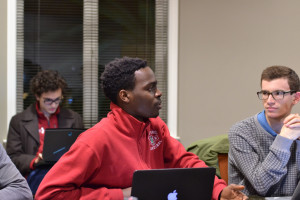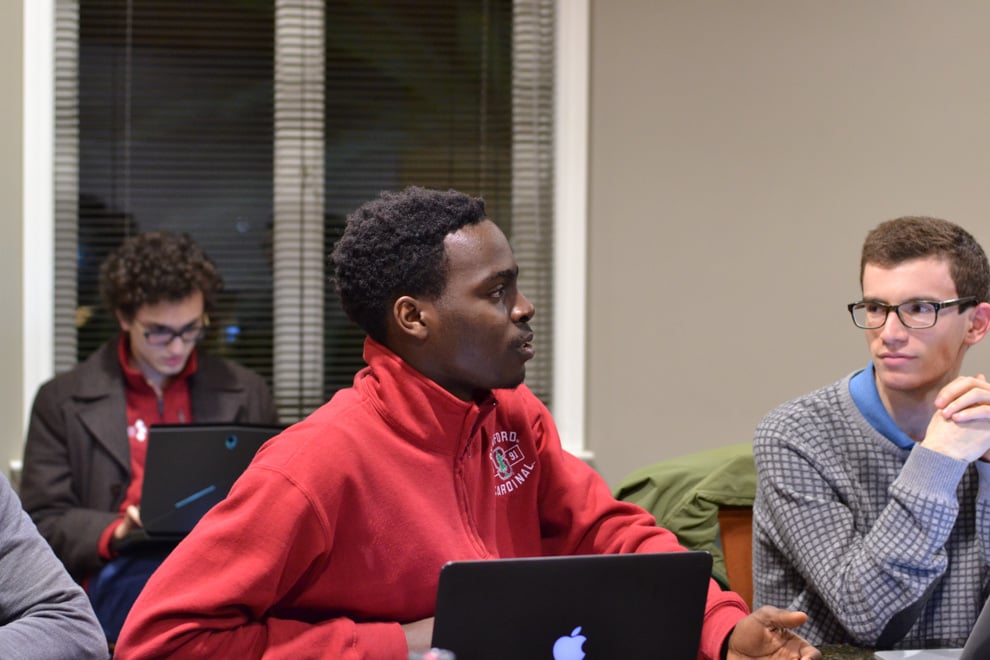
In its fourth meeting this quarter, the 17th Undergraduate Senate discussed a bill to abolish Senate committees, heard updates from ASSU Executives and overruled an Election Commissions decision on student groups included on the ballot. In addition, they approved funding requests and equipment lending for student groups.
ASSU Executive Update
ASSU Executives John-Lancaster Finley ’16 and Brandon Hill ’16 started the meeting by naming their three main goals for winter quarter. These included stronger Engaging Diversity requirements within major tracks, a mandatory first year curriculum about gender identity and sexual violence and campus renovations to represent native heroes at Stanford.
“We’re nearing the end of our time to leave a structural impact on this University, and we want to find out why Father Serra is so important on campus in place of native heroes or people of color,” Hill said.
Finley and Hill will be presenting their three-pronged approach at the Faculty Senate meeting on Feb. 18, together with a team of researchers and students.
In addition, Finley raised the issues around the Nominations Commission (NomCom), which selects student representatives to University-wide bodies, and is typically chosen by the preceding Commission. However, transition issues and term changes mean that there is no one currently serving on the Nominations Commission.
“It’s a huge problem to the ASSU; come a month from today, it’ll probably be the biggest problem student government faces,” Finley said.
He urged the Senate to take the opportunity to rethink student representatives nominations.
“The Nominations Commission hasn’t been working well for several years, ever since I got to Stanford,” Finley said, pointing to the divide between student representatives chosen by the Commission and the large student body.
“Student input is often sought through students appointed by the NomCom to University committees, but students get riled up, and University administrators often felt blindsided, even though the ASSU nominated people to represent students,” he added.
Bill to eliminate Senate committees
Restructuring student government surfaced again as the Senate discussed a new bill to eliminate all Senate committees, with the exception of Appropriations and Administration & Rules. The bill led into a larger debate on keeping Senators active and accountable, as well as envisioning the next Senate.
“I think it would allow us to do more productive things. It’s easy now for people who are not particularly involved to say, ‘I’m in this committee that does this,’” said Matthew Cohen ’18 of the bill he submitted. “We could model on UCSD and Berkeley, where the Senate website just lists the Senators’ names and the projects they’re working on, not a committee. It increases accountability, and I think there’s a free rider problem that it gets rid of.”
Finley and Hattie Gawande ’18 raised the concern that the Senate would be reduced to an administrative role, rather than a body that serves the full range of student affairs. Appropriations Committee Chair Justice Tention ’18 also acknowledged that the decision would directly impact upcoming Senate elections, making the restructuring highly time-sensitive.
“Keeping committees means you affect elections — people run saying they’ll be chair of a committee. If you get rid of it now, it makes it easier,” Tention said. “We didn’t have three months to think about what our year is going to be like; it’s just hit the ground running. The new Senate won’t have time to do that themselves. If we want to make changes, we need to think about now.”
The Senators present agreed on the need to first envision a new structure to replace the old committee-based system before completely removing all committees. The discussion was postponed for a later meeting when more Senators will be present to voice their opinions on the change.
Elections Commission rules and funding requests
Following last week’s discussion of student group attendance at funding information sessions, Eric Wilson ’16 outlined a new report on fair election rules and session attendance.
The Stanford Mendicants also appealed to be included on the ballot for funding, after their financial officer misread an email about the mandatory information sessions. The Senate voted to overrule Wilson’s decision to exclude the Mendicants.
Gawande responded to Wilson’s concern about the precedent set for other groups.
“I think it’s a pretty good precedent to set,” she said. “If they did miss the meeting and showed up here to talk to us, it’s more work on their part.”
Design For America (DFA), the Women’s Coalition and the Bent Spoon Dance Company saw their requests for funding approved. In particular, DFA was requesting for funds to provide snacks at meetings open to the school at large, in deference to Student Activities and Leadership policy on club inclusivity. The request was approved on the grounds that the event would be open to the whole student body.
The Senate also discussed a new system for renting out equipment to student groups in response to a KZSU request that the Senate purchase headphones for Silent Disco, rather than fund yearly rentals.
Contact Fangzhou Liu at fzliu96 ‘at’ stanford.edu.
